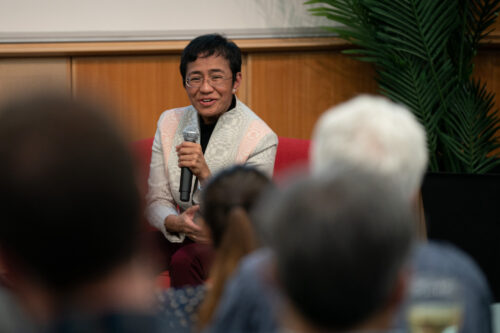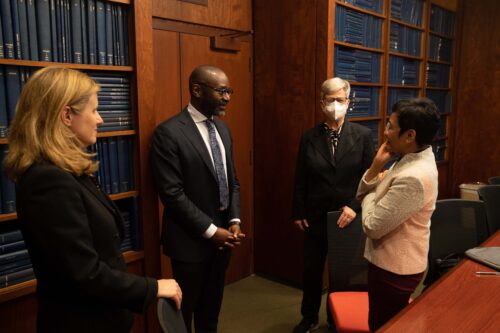When journalist and activist Maria Ressa won the Nobel Peace Prize in 2021, she had been subjected to online trolling for years. “If you’re the target of attack,” she told the audience at the annual Annenberg Lecture on Nov. 6, 2022, “the goal is not to make you believe anything. It is to pound you to silence.”

But for Ressa, a longtime CNN bureau chief who later co-founded Rappler, a digital-only news site in the Philippines, silence isn’t an option. “What used to be extremist behavior has now moved into politics. This is dangerous,” she said. “We’ve been here before. We do not want to be here again with the kind of technology that acts like gods without knowing what is happening. We cannot opt out.”
It’s that kind of resolve that Penn President Liz Magill referenced in introducing Ressa. “She’s tough, incisive, tenacious, brilliant, and obviously, she has a gift of courage that all of us can admire,” Magill said. “Any of her brushes with peril would have been enough to stop most of us. Getting out in one piece would have been enough.”
Ressa joined Magill, Annenberg School for Communication Dean John L. Jackson, Jr., Annenberg Public Policy Center Director Kathleen Hall Jamieson, and members of the Penn community to discuss those obstacles and the possible solutions—and sacrifices—necessary to ensure that truth prevails. The event was the first Annenberg Lecture held in person since the pandemic. It was also the third time Ressa has spoken at the Annenberg School, including at the launch symposium for the Center for Media at Risk and for the Center’s symposium on how journalists operate in authoritarian states.
At the Sunday lecture, she began by describing the battle we all currently face for “facts, truth, trust.”
“Without these three,” she said, “we have no shared reality, we cannot solve any problem together, and we cannot have democracy.”

She then spoke about social media and big data, about how lies spread faster than truths, and the way in which these platforms are being used on a grand scale as manipulation tools by authoritarian regimes. “If you can make people believe lies are the facts, then you can control them,” she said.
Ressa had data to back up her points. In one example, she showed a graph with about a dozen words representative of attacks against the media in the Philippines. Between mid-2015 and mid-2017, bayaran, which means “corrupt” in Filipino, appeared in some 50,000 social media posts and about 1.7 million comments about journalists. In that same timeframe, the word for “biased” appeared in about 1 million comments, peaking at around 30,000 comments a day.
Social media have become the new gatekeepers, Ressa said. Here, she returned to the point she’d previously made about the spread of disinformation, citing a 2018 MIT study. “Lies spread faster than facts, at least six times faster. And especially my generation, we [are] prone to spread it at least six times more,” she said. “A tweet that’s a lie, especially if laced with anger and hate, you are more prone to retweet it 70% of the time.”
The annual Annenberg Lecture, hosted by the Annenberg School for Communication and the Annenberg Public Policy Center, brings to Penn leaders in academia, politics, public policy, or the media. It combines two previous lectures, the Walter and Leonore Distinguished Lecture in Communication, which started in 1992, and the Leonore Annenberg Lecture in Public Service and Global Understanding, which began in 2006. Both series and the subsequent single lecture honor Ambassador and Mrs. Annenberg, without whose vision and support the Annenberg School and Annenberg Public Policy Center would not exist.
To read the full story about Maria Ressa’s talk in Penn Today, where it originally appeared, click here.

